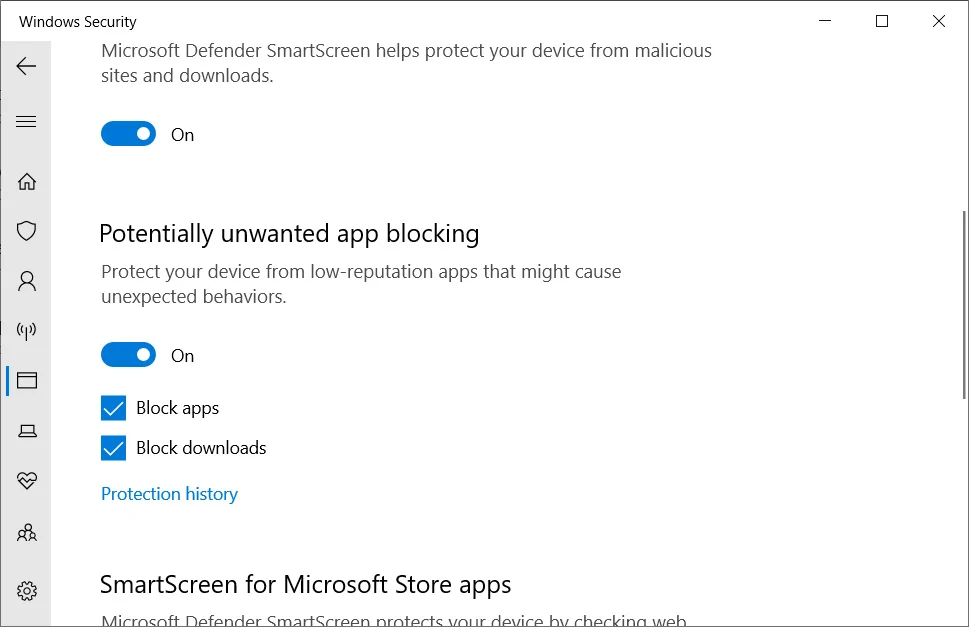Microsoft Defender and Microsoft Edge in Windows 10 will automatically block unwanted applications (PUA from potentially unwanted applications) by default from this month.

In the 2004 version of Windows 10, the May 2020 update, the company added the new 'Potentially unwanted app blocking' setting and Microsoft Defender can now block these types of apps.
When the new setting was released it was disabled by default, but from this month, Microsoft will start blocking PUA when detected automatically.

"From the beginning of August 2021 we will start activating it by default to make it easier for you to maintain your systems with the best possible performance," said Microsoft.
Windows 10 users who do not wish to exclude PUAs by default can turn off the feature from the Windows Security settings screen.
The "Block Applications" option will enable PUA scanning and blocking by Microsoft Defender. The "Block Downloads" option will check if the "Block potentially unwanted applications" setting is enabled in the new Microsoft Edge browser. When enabled, SmartScreen will block PUAs and PUPs as they go down.
This auto-blocking change is very useful for all Microsoft Defender users as we know that PUA or PUP applications should be treated as malicious.
What are the potentially unwanted applications?
These applications, also known as PUA or PUP, are not completely malicious, but they are very close.
They are usually created by legitimate companies for extra profit. So we have seen extensions browsers, adware, programs that send usage data without permission, Windows cleaners, antivirus programs that use false positives, and of course programs that don't deliver what they promise.
Microsoft somewhere explains that the use of such applications can seriously affect the stability of Windows.
“Some products like cleaning utilities registerυ αναφέρουν ότι το μητρώο χρειάζεται τακτική συντήρηση ή καθαρισμό. Ωστόσο, μπορεί να προκύψουν σοβαρά προβλήματα αν τροποποιήσετε εσφαλμένα το μητρώο χρησιμοποιώντας αυτούς τους τύπους των βοηθητικών προγραμμάτων. Αυτά τα ζητήματα μπορεί να κάνουν τους χρήστες να επανεγκαταστήσουν το λειτουργικό σύστημα λόγω αστάθειας. Η Microsoft δεν μπορεί να εγγυηθεί ότι αυτά τα προβλήματα μπορούν να επιλυθούν χωρίς επανεγκατάσταση του Λειτουργικού Συστήματος, καθώς η έκταση των αλλαγών που πραγματοποιούνται από αυτά τα βοηθητικά προγράμματα καθαρισμού μητρώου ποικίλλει από εφαρμογή σε εφαρμογή.”
Microsoft's criteria for designating a program as a potentially unwanted application are as follows:
Advertising software: Software that displays ads or asks you to respond to queries for other products or services in completely different software. They contain software that inserts ads on web pages.
Software Torrent: Software that usesto create or download torrents or other files specifically used with peer-to-peer file sharing technologies.
Cryptomining Software: Software that uses your device's resources to extract cryptocurrencies.
Commitment software: Software that offers to install other software that is not digitally signed by the same company. Also, software that offers to install other software labeled as PUA with base the criteria described in this document.
Marketing software: Software that monitors and transmits user activities to applications or services for marketing research.
Avoidance software: Software that tries to avoid detection by security products, as well as any software that behaves differently in the presence of security products.
Malicious software: Software that identifies trusted security providers with their security products.
Unfortunately, there are applications that may meet the above criteria and be detected as PUA by Microsoft Defender.
For example, mining applications that are not used for illegal purposes may be detected by Microsoft Defender as malicious.
In these cases, you should create exceptions in Microsoft Defender to prevent these files from being quarantined instead of disabling the entire feature.





